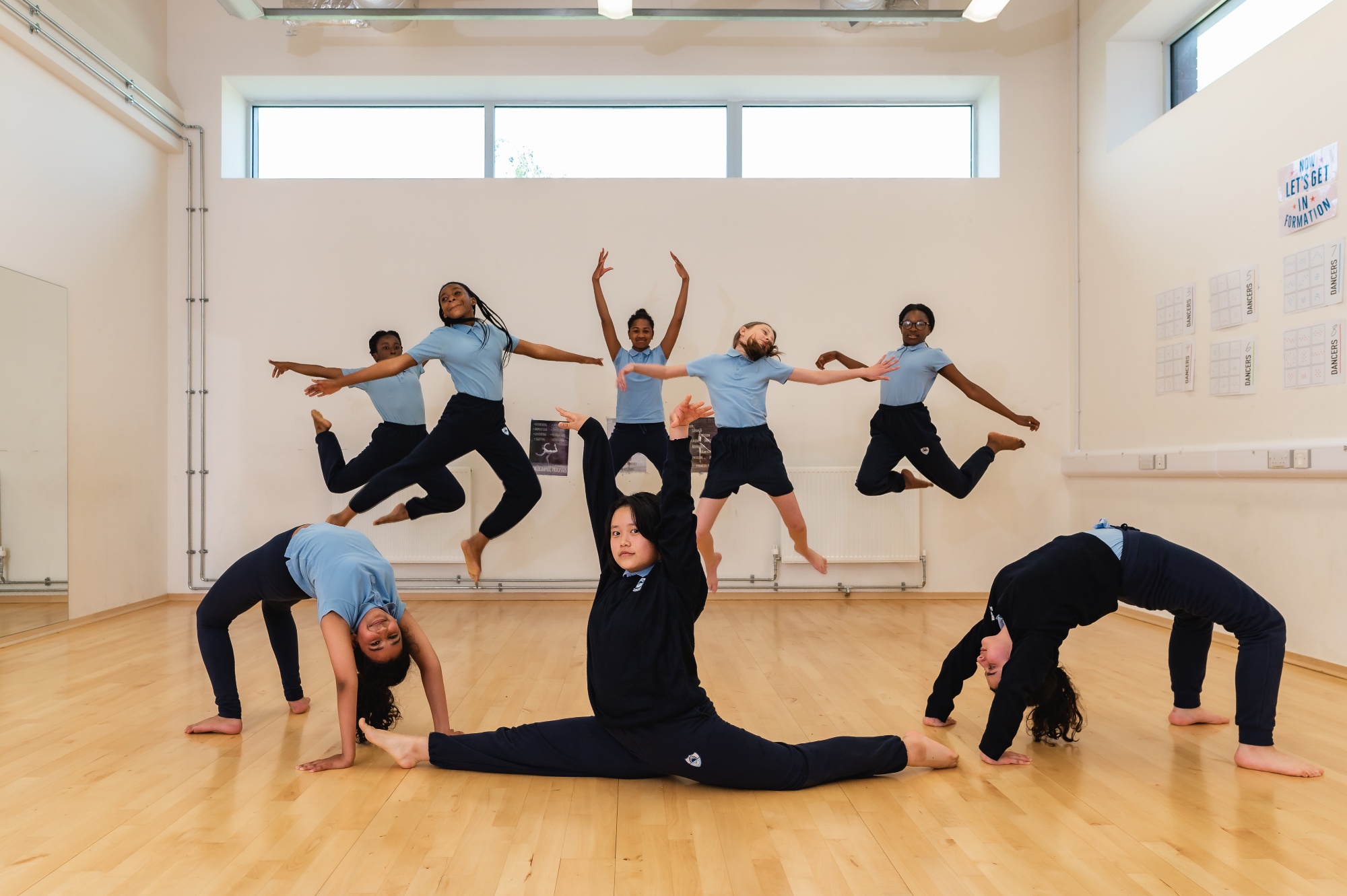Performing Arts (Dance)

Head of Department: Miss Kayla Scott
The dance curriculum design means an appreciation for dance as an expression art form, through the development of lifelong skills including creativity, teamwork and confidence.
By the end of KS3, students are prepared to apply their knowledge and understanding of creative arts, through a range of skills, processes and techniques.
By the end of KS4, dance education provides students with the ability to create and perform choreographies and critically analyse professional work. The BTEC Performing Arts course enables learners to work collaboratively, develop non-verbal communication, improve physical well-being, interact with diverse cultures and increase kinaesthetic knowledge of the self. The study of Performing Arts also enables students to offer themselves as versatile applicants for Higher Education opportunities.
Year 7 and 8
Content
We cover a wide range of stimuli and dance styles over years 7 and 8, introducing pupils to the world of Dance. The curriculum is designed to develop practical abilities, creativity, knowledge of professional performance work, and reflective skills.
Assessment
Each half term, students will complete an assessment designed to reflect either the practical or theoretical components found on the BTEC course, depending on the skills being emphasised during that period. These assessments are structured to develop the required skill sets, with clear guidance provided on how to prepare effectively. The results of these assessments serve as valuable evidence and inform planning and lesson focus, ensuring that every student receives targeted and structured teaching.
Homework
Homework is set once a fortnight at KS3. These homework tasks can take various forms and will be fully explained to students by class teachers and set on Edulink.
How Parents and Carers Can Support
- Encourage your child to attend dance classes outside of school, such as Ballet, Tap, Modern, Jazz etc.
- Encourage your child to watch professional dance performances, both live or on-screen. This could include visiting the West End to watching Strictly Come Dancing.
- Encourage your child to rehearse their choreography at home.
- Offer help or guidance for homework tasks.
- Encourage and support pupils in attending extra-curricular activities in dance or theatre.
Additional Support Available/Useful Links
- https://www.onedanceuk.org/
- https://qualifications.pearson.com/en/qualifications/btec-tech-awards/performing-arts-2022.html
- Pearson REVISE BTEC Tech Award Performing Arts Revision Guide Step-by-step
Year 9, 10 and 11
Exam board and syllabus code:
Pearson BTEC Level 1/Level 2 Tech Award in Performing Arts (603/7054/3)
This course is a single option at Key Stage 4, resulting in a grade of Distinction, Merit or Pass and provides the equivalent points of 1 GCSE at 9-7.
Content
BTEC qualifications are designed to provide specialist work-related qualifications in a range of sectors. They have been developed to provide the knowledge, understanding and skills necessary to prepare learners for employment and /or to provide career development opportunities for those already in work. On successful completion of a BTEC Tech Award qualification, learners may progress into or within employment and/or continue study in the vocational area or related course of study. Pupils will study the Dance pathway.
Assessment
Component 1 – Internal Assessment (100% Theory)
- Learners will complete a research task based on a range of dance choreographers and complete a research journal that demonstrates their understanding of the practitioner’s style.
Component 2 – Internal Assessment (60% Practical and 40% Theory)
- Learners will workshop, rehearse and perform a 2 minute ‘professional’ piece of repertoire, from a chosen practitioner. They will be assessed on their commitment to rehearsals, the range of performance skills used and on written tasks in logbooks that should demonstrate consistent self-reflection and evaluation.
Component 3 - External Assessment (30% Practical and 70% Theory)
- Learners will choreograph a performance based on an externally assessed set brief. They will be assessed on how they develop the work, range of performance skills used and on written tasks in logbooks that should demonstrate consistent self-reflection and evaluation.
Homework
It is important to note that there is an expectation that pupils attend regular after-school rehearsals. Other homework includes working towards the performing arts log; research, reflection, analysis and evaluation.
How Parents and Careers Can Support
- Ensure pupils attend all performance trips, workshops and visits.
- Encourage your child to attend dance classes outside of school, such as Ballet, Tap, Modern, Jazz etc.
- Encourage your child to watch professional dance performances, both live or on-screen. This could include visiting the West End to watching Strictly Come Dancing.
- Encourage your child to rehearse their choreographies at home.
- Offer help or guidance for homework tasks.
- Encourage and support pupils in attending extra-curricular activities in dance or theatre.
Additional Support Available/Useful Links
- https://www.onedanceuk.org/
- https://qualifications.pearson.com/en/qualifications/btec-tech-awards/performing-arts-2022.html
- Pearson REVISE BTEC Tech Award Performing Arts Revision Guide
- Watch as many professional dance performances as possible!
